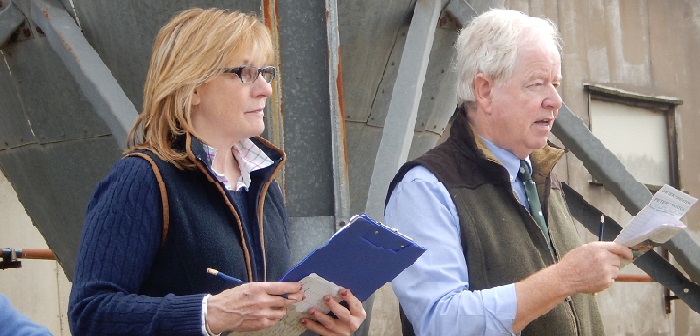Very little variation in pig prices with hopes that we may be ‘bumping along the bottom’ with the German producer price holding firm and the SPP also at similar levels currently quoted at 148.25p.
Unfortunately some, but not all, weekly contribution abattoir prices slipped by 1p, with others standing on, but the end of January is normally a particularly difficult time for pig meat sales and hopes remain that we might see some improvement as spring approaches.
The spot bacon market remains subdued and there are reports of some contract pigs being rolled, but, all in all, a difficult rather than disastrous day, with spot bacon from regular sellers at or around the 136-140p mark, with one off loads of spot bacon pigs closer to 130p.
Cull sow prices seem to have paused for breath in connection with their recent slide, with prices generally at stand on levels despite a stronger pound which saw the Euro dip in value, on Friday trading at 87.32p compared with 88.39p a week earlier. As a result, most culls were traded at or around 60p/kg which is still a miserable price, but continues to underline the weakness of the European-wide pig meat market where the average producer pig price works out in the region of 112p/kg. This is a huge discount when compared with comparable GB values and one of the reasons why much cheaper imports have continued to penetrate the domestic market.
Weaner prices have, however, continued to stage a modest rally with the latest AHDB 30kg average up by £1.28/head to £53.09 and the 7kg average also up by 0.16p/head to £37.88.
Perhaps these are signs of a little more optimism amongst weaner buyers together with hopes that finished pig values will recover to some extent in the spring and may help to explain why this market is a shade firmer. But there is still a wide difference between contract and spot values, with the latter looking to be at bargain basement figures in some cases.
Grain prices have remained at generally similar levels, with UK spot ex-farm feed wheat hardly changed and quoted at an average of £135.50/t and feed barley trading at a £10/t discount.
Futures markets saw some forward positions ease a shade with March feed wheat quoted on the LIFFE market at £135.40/t and November also a touch easier at £140/t. The current strength of the Euro has been putting further downward pressure on European commodity markets affecting their competitive value on a global basis and, as previously, currency changes will continue to rule the roost as far as commodity prices are concerned.
UK soya prices have, however, risen to a mid-January value of £312/t for 48% Brazilian soya meal and 34% rape meal is also firmer by £5/t and now stands at £171/t.
And finally, no surprise to hear that NPA Chairman Richard Lister feels that much of the pig industry has been ‘let down’ by what is known as the Public Procurement Regulation (PPR) with Government departments buying on a least cost basis. Catering procurement also reflects benefits to UK agriculture as a whole not to mention the higher welfare standards which often apply.
There is a saying that sometimes ‘the cheapest are the dearest and the dearest are the cheapest’.




